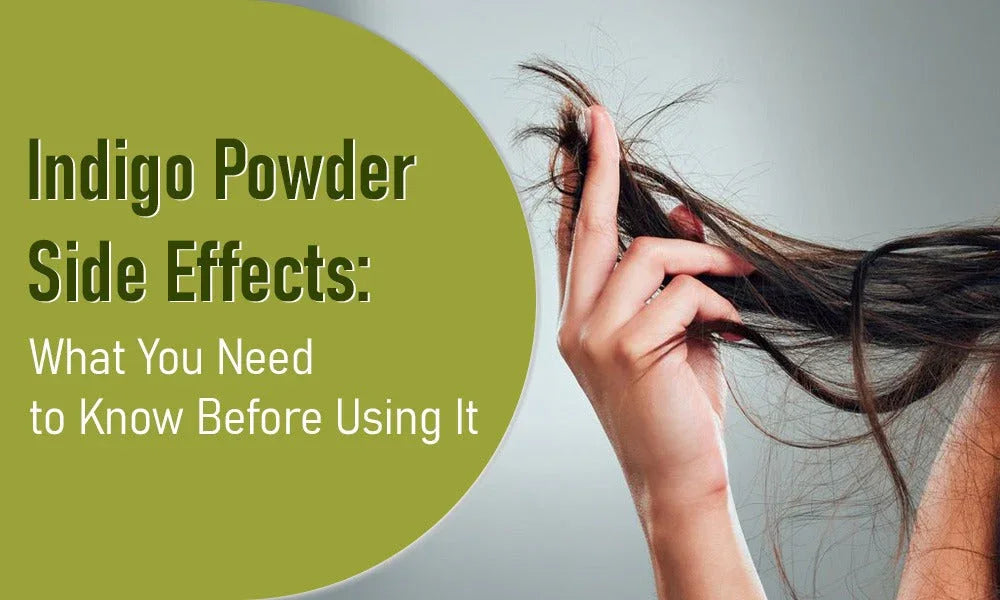
Indigo Powder Side Effects: What You Need To Know Before Using It
Table of Contents
Natural dyes have lately seen a comeback in popularity, with indigo powder being held as one of the most trusted and efficient botanical options. Alongside henna, indigo powder has traditionally been used not only for coloring hair but also for promoting scalp health. Well, it is probably best to know its components, properties, and any risks before indulging in using it.
What Is Indigo Powder?
Herbal dye indigo powder comes from drying leaves of the Indigofera tinctoria. The plant has led a strange existence in India, Persia, and through Asia, where it was mostly used for textile dyeing via the natural method of indigo application, or else as color for hair and cloth.
Ingredients
The pure indigo powder contains one predominant active ingredient:
Indigotin: It is a natural blue dye bearing deep color pigment.
Tannins: Plant-based compounds known to have astringent and anti-inflammatory effects.
Flavonoids : Aid in scalp health and possibly help calm irritation.
Minor alkaloids : The rest are plant alkaloids that help in natural dyeing.
Advantages of Indigo Powder
Natural Hair Dye
Indigo powder provides a rich black or deep brown shade in the presence of a sunny day. An interesting natural replacement for preaching a hair dye.
Works as Conditioner
With regular use, it will make hair glossier, softer, and easy to comb.
Promotes Scalp Health
Its antimicrobial property gives relief to scalp irritations and balances the scalp, reducing dandruff along the way.
Natural Grey Hair Cover
Long garland white carpet coverage and gentle treatment with henna dyes are offered by indigo.
Strengthens Hair Roots
Many believe it strengthens the roots and counters falling of hair when used regularly.
Are There any Side Effects of Indigo Powder?
When correctly used pure and chemical-free indigo powder, no side effects are known. However, the user should be mindful to ascertain that the powder is 100% natural, synthetic-free, and free from para-phenylenediamine (PPD) or other harmful chemicals — these can sometimes be present in adulterated or inferior products.
Take Precedence
Remember to conduct a patch test before full application to avoid potential allergic reactions(as with any natural herb).
Only purchase pure, organic, and chemical-free indigo powder.
Do not apply indigo powder to damaged or pierced skin.
Application of Indigo Powder
Black Hair : Apply henna first, rinse it out, and then apply the indigo paste to achieve a jet-black color.
Brown Hair : Apply a mixture of henna and indigo powder, prepared in any choice of proportional combination.
Always mix indigo powder with warm water and apply immediately (the dye releases fast).
References (Points for Further Reading)
Indigofera Tinctoria and Its Applications in Hair Care – Journal of Ethnopharmacology
Traditional Plant-Based Dyes for Hair — A Safer Alternative to Synthetic Dyes – International Journal of Cosmetic Science
The Antimicrobial Properties of Indigofera Tinctoria – Phytotherapy Research
Natural Hair Dyes: Comparative Study on Henna and Indigo – Journal of Ayurveda and Integrative Medicine
Plant Flavonoids and Their Benefits in Scalp and Hair Health – Journal of Dermatological Science
The Revival of Indigofera Tinctoria in Sustainable Beauty – Herbal Medicine Reports
FAQ
1. Can indigo powder cause allergic reactions?
Yes, some individuals may experience allergic reactions like itching, redness, swelling, or rashes on the scalp or skin after using indigo powder. It’s advisable to do a patch test on a small area of skin before full application.
2. Does indigo powder dry out the hair or scalp?
Indigo powder can sometimes cause dryness of the hair and scalp, especially if used frequently without adequate conditioning. To prevent this, it's recommended to apply a nourishing oil or conditioner after rinsing the powder.
3. Is there any risk of scalp irritation or sensitivity?
Prolonged exposure or improper rinsing of indigo powder may lead to scalp irritation, sensitivity, or itchiness. Always follow the recommended usage instructions and rinse thoroughly to avoid residue buildup.
4. Can indigo powder stain skin or clothes?
Yes, indigo powder can easily stain the skin, nails, clothes, or surrounding surfaces during application. It’s best to wear gloves, use an old towel or cloth, and apply a barrier cream around the hairline to minimize stains.

